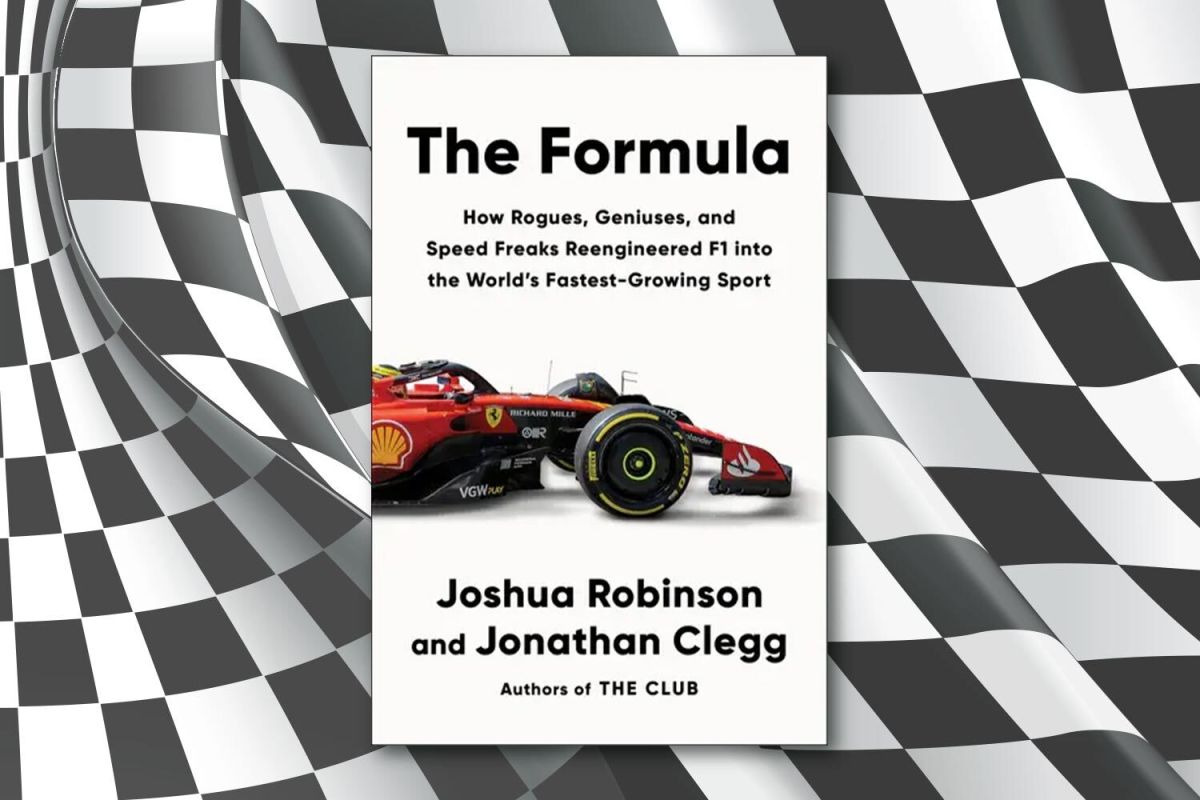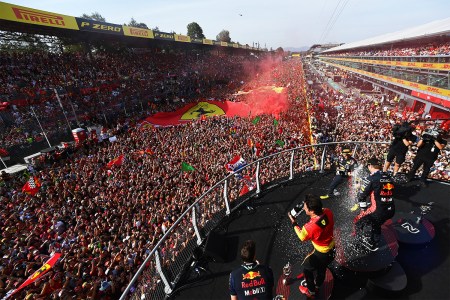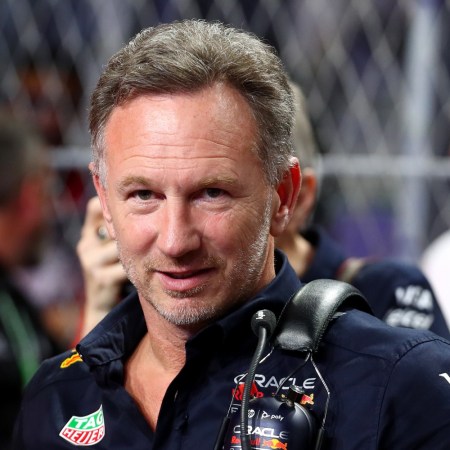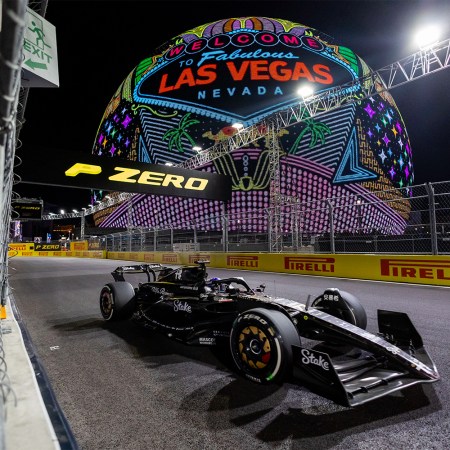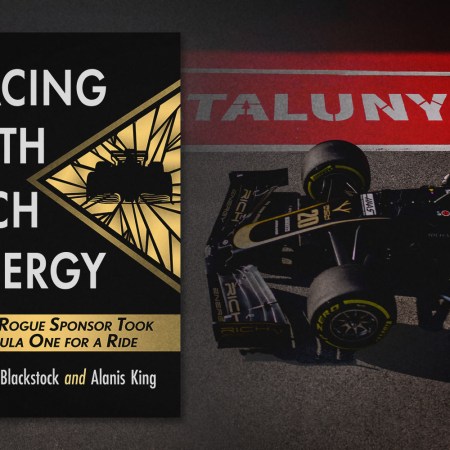Every sport has its legends, its larger-than-life characters and its iconic moments that thrill and surprise the people watching it all play out. Few sports have evolved more over the last few decades than Formula 1, however — and it turns out that’s something of the point.
The new book The Formula: How Rogues, Geniuses, and Speed Freaks Reengineered F1 Into the World’s Fastest-Growing Sport is a fascinating look at the current state of Formula 1, and the team owners, engineers and drivers who helped bring it into being. It’s a collaboration between reporters Joshua Robinson and Jonathan Clegg, who previously took on another fascinating case of sports and business converging with The Club, about the English Premier League.
InsideHook spoke with Clegg about the origins of The Formula, the current scandal surrounding Red Bull’s Christian Horner and where the sport might go from here.
InsideHook: The epilogue of The Formula is set against the backdrop of the 2023 Las Vegas Grand Prix. That made me wonder how long this book was in development. Did it begin before the Liberty Media takeover? Or was it more recent?
Jonathan Clegg: It was midway through the 2022 season that we began to think about the fact that there was probably a story to tell about Formula 1 and what was happening right now. We then spent the better part of a year reporting and thinking about the story, and then getting the book written.
I think Vegas was already on the calendar when we started writing the book. I remember being there one year out from the race, when they talked through everything they were about to do to transform the Strip into the straight for the Grand Prix. As we began to think about the book and put everything together, I think quite quickly we realized that Vegas would be the right note to end on because it seemed very emblematic of everything that was happening to Formula 1.
It really sunk in how different the Vegas race was going to be when I was at a family gathering and heard members of my family discussing how the race wouldn’t start until 1:00 a.m. Eastern time.
It was, in a way, the perfect capstone to the book. I was about to say that it’s something that would be unfathomable in an earlier Formula 1 era. But of course, Formula 1 did try to race in Vegas many years ago. It was a complete debacle, obviously, and Bernie Ecclestone [former chief executive of the Formula One Group] decided he couldn’t get out of there fast enough.
But certainly, the way that it was pulled off by Liberty Media, with the pictures of the drivers on the sides of the buildings and the whole Strip shut down and the whole thing filmed by dozens of helicopters — that really epitomized everything that the Liberty Media era of Formula 1 has stood for. There’s just a veneer of corporatism and professionalism that wasn’t there before — and some may say Formula 1 desperately needed — and some might say that it has made it indistinguishable from many other mainstream sports.
To the extent that there is a central character of this book, Bernie Ecclestone feels like that figure. When you began talking to him, did you have a sense that he was going to have such a central role in the book, or did that emerge as you began working on it?
I think we knew pretty much that he was going to be a big character. Formula 1 was a sport that started in the early 1950s, but pretty much from the 1970s it was run by one man. And that was Bernie Ecclestone. He had been a used-car salesman and had been involved as a team owner. It would be wrong to say that he bought out the series — he just took control of it without much resistance from anyone else.
He then stuck with it through the era when these things went from being mostly in-person live events, live spectator events, to television products. Bernie Ecclestone was the absolute master of turning Formula 1 into a global TV property.
The early days of Formula 1 where drivers routinely were killed on the track — those days were one thing. Aerodynamics came into the sport at roughly the same time as Bernie, although Bernie knew absolutely nothing about aerodynamics. It was those twin introductions, Bernie on the TV side, turning Formula 1 into a big TV entertainment product, and aerodynamics turning Formula 1 into this high-tech engineering problem. Those two things animate what we really think of as modern Formula 1.
Also, Bernie’s just an incredible character. The guy’s known as “the Supremo” and operates out of a small hideout on Grand Prix weekends known as “the Kremlin.” He knows literally everyone. He’s one of the few men who brought Putin to bear, got him to cough up more money than he wanted to for a Grand Prix in Russia. He’s just an absolutely incredible character, the likes of which we would never see again. So all those three things together: longevity, impact on the sport and the number of absolutely insane stories that he’s been involved in meant that we knew he was going to be a really compelling character.
Has he had any informal involvement with the sport since the Liberty Media takeover?
No, I think he’s been basically airbrushed out of history because his capacity to make money is only matched by his capacity to say truly terrible things that no one should say; and so because of that, he really does not fit with the current, very brand-focused approach of Formula 1 leadership. I think it was after his third or fourth major foot-in-mouth gaffe that they just decided he was no longer welcome at the track.
He’s really persona non grata in Formula 1 circles at the moment, even as much as I think many of the people still involved — certainly the people who have been around Formula 1 for a long time, who predate Liberty Media — all of them know what an impact Bernie had on the sport. He’s still held in high regard by those guys. He’s just not really welcome at Formula 1 events anymore.
I would imagine you’re getting a fair number of questions about Christian Horner as you’ve been doing press for this book. Did you have any sense that something like that scandal might’ve been coming down the pipeline as you were working on the book?
I think this was something that was completely under wraps. We spent an entire race weekend with Red Bull just a few months ago, in Suzuka last October. We spent time around Christian during the reporting of the book. We had lunch with him here in New York and interacted with him many, many times during the reporting of the book. But we had no sense of this at all. I think it’s wrong to say that there was anything that you could spot in his history or background that would suggest that something like this would happen.
But I will say that Christian Horner is a guy who got where he got by his willingness to really push at the boundaries of what his team could accomplish — and sometimes that meant running up against the way that things were typically done in Formula 1. The way that Formula 1 teams typically worked is a way that normal businesses definitely do not operate. Formula 1 is a sport and a business, and no team operates in a way that you would necessarily want your own office to function.
Red Bull were definitely the pioneers of doing things very differently, almost brazenly un-corporate in the way that they started, especially in the early days when it was all about blasting music and hosting a nightclub on the roof — all access, no secrets, anyone could come in, anyone could go out.
I think that in the first season that Horner took over, he was being paid a bonus for every point they scored over what the team had achieved when they were Jaguar [Racing] the previous season. And to really capitalize on that, he pulled every lever available to him. He rotated out the number-two driver. If he felt like a guy wasn’t cutting [it], he would just cut him after one race, bring in somebody else, change that guy out again. They would run the engines in higher power modes than they were supposed to. The Cosworth guys were screaming at them to turn the power down because they were about to explode. He was a guy who really pushed at the limits of what his team could get away with in order to pursue success, and a guy who lived at the limits of orthodox and acceptable behavior.
I’m not saying that any of that necessarily presages what we’re learning now. I think those two things belong in different compartments, but as a context of who the guy is, I think it’s instructive.
Formula 1 Is Sweeping the Country. It Still Has a Long Way to Go.
A dream trip to the Monza Circuit for the Italian Grand Prix reveals America’s shortcomings in the sportOne of the things that you emphasize early in The Formula is the way working around what is and is not in the rulebook is a central part of the sport — and that the governing body regularly identifies things that are being done effectively and changes the rules to make them off limits. That struck me as an interesting way to approach Formula 1.
Early on in the writing of the book, as we began to think about the teams and the individuals that we wanted to focus on, we realized that this is a sport about loopholes and taking advantage of loopholes. The people who have succeeded most in this sport are the ones who are willing to take advantage of those loopholes. Then as soon as they’re closed, they reinvent themselves and find a new loophole to exploit and on and on.
Formula 1’s willingness to rewrite its rulebook is like if the NBA said, “The three-point line has completely changed the game and we don’t like the way it’s going, so we’re just going to do away with three-pointers.” What would the Golden State Warriors, for instance, do if that happened? Formula 1 teams have to react and adjust to those sweeping rule changes every four, five, six years. That is why the history of Formula 1 is written by the guys who have spotted loopholes or gray areas in those regulations — taking advantage of them to the maximum that they can in the period while those loopholes exist.
Then there’s generally a shake-up of the rules. Generally, one dynasty then gives way to another because the whole sport gets essentially table-flipped by these rule changes. As the pieces come down, you find that they’ve rearranged themselves in a different order and this team who was previously in the middle of the pack has actually spent the past few years thinking about how they could adapt to the new rules and where they might be able to find an advantage in the new rules. Then they’re propelled to the front and everyone’s chasing them — and then the sport changes the rules again, and it all happens over and over.
When you see Formula 1 like that, the guys who stand apart as the ones who have changed the sport with the loopholes that they identified and capitalized on present themselves very clearly, from Colin Chapman in the very early days of Formula 1 through Ron Dennis, Frank Williams and Ross Brawn. These are the guys whose achievements were a part of Formula 1 history because they were able to so successfully and so impactfully identify loopholes and take advantage of them.
Those loopholes can be really different. Colin Chapman basically invented aerodynamics in Formula 1. Ron Dennis never went to college, had no degree, knew nothing about engineering or aerodynamics; his contribution was the idea that these teams were as much marketing and branding operations as they were sporting endeavors. His decision to turn McLaren into the ultimate corporate competitor was the thing that made McLaren a dynasty in the ’80s and ’90s.
Their contributions can be massively different and come from wildly different areas, but in different ways, they’ve all latched onto this spirit of reinvention that has animated Formula 1 for the past 50 years.
Reading the book, I found myself fixating on some of the short histories of different racing teams that are no longer associated with the sport. I had not realized that Benetton was a pretty substantial presence for a few seasons, for instance. Under the current ownership, do you see there being a little bit more stability within the sport? Or do you think we’re going to start seeing another period of certain teams that have found some success opting to get out of the racing business and others re-entering the fold?
When you look at some of the most dominant and longest-serving teams in Formula 1, you think of the likes of Williams, for instance, who for so long were at the absolute cutting edge of Formula 1 development. What future does Williams have when their resources are stretched pretty thin? Back in the ’70s and ’80s, it was possible for teams with minimal resources to come up with a clever design or an innovative feature and propel themselves right to the front.
The Williams team has never been awash in cash, even when they were winning championships at a prodigious rate. So it’s not new that Williams as an independent team essentially is fighting to compete with the likes of Ferrari. But yes, I do wonder what that will look like now, especially given the sport’s new kind of profile. You see manufacturers who left the sport 10 or 15 years ago clamoring to get back in — Porsche and Audi and Cadillac with the Andrettis trying to get back in. Are they going to expand the field to let those teams in or will some teams drop out to make way for those established manufacturers?
At some point, it does become an allocation of resources issue. Will some of those teams at the back, even the ones with very illustrious names like Williams, be able to compete with a series of automotive giants at the front?
You’ve also co-authored a couple of books that deal with soccer. Did you find any parallels in terms of writing about these two sports and the way they’ve evolved? Or did you find them to be very, very different as far as ownership and management?
First of all, I’ll say that in the actual mechanics of writing the book, there was a huge difference. Anyone who has ever covered or followed or dealt with professional soccer will know that is a sport where access is almost impossible to get. Their locker rooms are closed. They do not welcome reporters into the athletes’ lives. Professional soccer players basically do their best to avoid reporters at any and every opportunity they can find, and so access is super hard to get.
Formula 1 was the exact opposite. We found that when we told people we were writing a book, Formula 1 really threw open their doors. Pretty much everyone, every team, every individual, every job, anyone that we wanted to get for this book that we really decided that we wanted to have, we were able to get, which was fantastic.
In terms of the actual content of the book and what’s happening with those sports now, one of the things that struck us is that where Formula 1 is right now feels a lot like where English soccer and the English Premier League were 10 or 15 years ago.
Formula 1 is a global sport with teams from all sorts of different countries and drivers from all sorts of different countries, but it is essentially a British sport in that 80%, 90% of the teams are based in Britain. Probably 95% of the workforce is British. I think that the trajectories they went on were very similar in that they were undervalued sports where local businessmen and self-made men and local entrepreneurs were pulling the strings and running the teams in the late ’80s, early ’90s, and then television money came in and exploded the sports and they became much more popular and money poured in — and then those guys sold out to much bigger fish.
They went from being sports run by local, self-made men to sports being run by billionaires. In that sense, the trajectories of the two sports were really similar. Now, where it felt a little bit different to us — I would say that our first book, The Club, which unpacked the rise of the Premier League as a global entertainment monster, and The Formula feel like partners in a way. They felt like two books of a series because they do tell similar stories.
The thing that has really transformed English soccer in the past 10 or 15 years has been the influx of an absolutely unimaginable amount of wealth and money from the Gulf and the Middle East in terms of the state-run clubs and their sovereign wealth funds pouring money into soccer as a way to essentially promote their countries through the vehicle of sport. Now, that hasn’t happened so much in Formula 1 yet.
One of the really funny things that we realized during the reporting of the book is that actually the first involvement of the Gulf in using sports to promote itself happened in Formula 1 way back in the late ’70s when Williams was sponsored by Saudi Arabia. But we haven’t seen those wealth funds invest in Formula 1 in quite the same way as they have in European soccer yet.
We do know that Saudi Arabia’s sovereign wealth fund was interested in just buying Formula 1 — the entire sport — not long ago. How long Liberty Media wants to hold on to Formula 1 versus cash out, that’s something that will be interesting to see in the coming years, as will the idea of whether one of those countries decides to become involved in running a team and what that would look like.
Do you have a sense of why there hasn’t been something as comparable as a Manchester City or a PSG or a Newcastle scenario on the Formula 1 team level yet?
Until recently, Formula 1 was still a bit more of a niche sport. I think that’s changed. I think there’s also the fact that even though [Middle East] countries haven’t really got involved in owning a team or owning the sport, they do stage Grands Prix in a lot of those countries. In a sense, they are already benefiting from the halo effect of Formula 1 by staging, for instance, last weekend’s Grand Prix in Bahrain or the Grand Prix in Saudi Arabia or the climax of the season in Abu Dhabi.
They’re already involved in hosting races, so perhaps they don’t feel it’s necessary to get involved in owning and running a team. Whereas in soccer, obviously they can’t stage Premier League games or Champions League games in Saudi Arabia, so they just had to buy the team instead.
Was there any particular moment in Formula 1 history that you unearthed when you were researching this that really surprised you or changed the way that you thought about the project?
When Josh and I were kids, it was right at the start of the Williams run in the early 1990s when they won titles with Nigel Mansell and then with Alain Prost and then Damon Hill. They were really the team to beat in Formula 1 at the time. Honestly, we went into writing this book without any real idea as to why that was.
I knew, broadly, why McLaren had been successful and Ron Dennis’s professionalization of Formula 1 and especially the marketing, Madison Avenue side of things. I thought I knew that Ferrari and Benetton were successful basically because they had Michael Schumacher, who was like the GOAT driver, and he transformed things there. We had some cool stories about why Ferrari was successful with Schumacher.
But I really had no sense of why Williams was successful. I think the fascinating and cool thing there is that was the time when Formula 1 really became involved in computer and electronic aids. It looked to be lurching towards a system where the cars essentially did all the work of a driver themselves. By the early to mid-’90s, 1993-94, Williams had a car that not only would change gear by itself, but was so sophisticated that it could also look at the contours of the corner that it was approaching and adjust its suspension so that it could turn the corners at exactly the perfect ride height to go through the corner and lose as little speed as possible — very sophisticated technological advances that even today we would find quite incredible.
This was another thing that Formula 1 just legislated out of the sport. What’s fascinating about that is I think that was the last period where Formula 1 was really at the cutting edge of what the automotive industry was trying to do, because that was at a time when the automotive industry was also starting to introduce things like ABS and power steering and all the things that Formula 1 was also working on at the time.
That really marked the end of this whole idea that animated Formula 1 for many years, that it was the R&D department for these big automotive manufacturers. When that happened, when Formula 1 legislated electronic aids out of the sport, that really became the time when it diverged from what car manufacturers were working on and trying to do and branched off in this separate trajectory, which has led us to where we are now, where Formula 1 cars are not at the cutting edge of those areas. That was a deliberate idea — that they wanted the driver to still be the most important figure in terms of driving the car from start to finish.
This interview has been edited and condensed for length and clarity.
Whether you’re looking to get into shape, or just get out of a funk, The Charge has got you covered. Sign up for our new wellness newsletter today.
